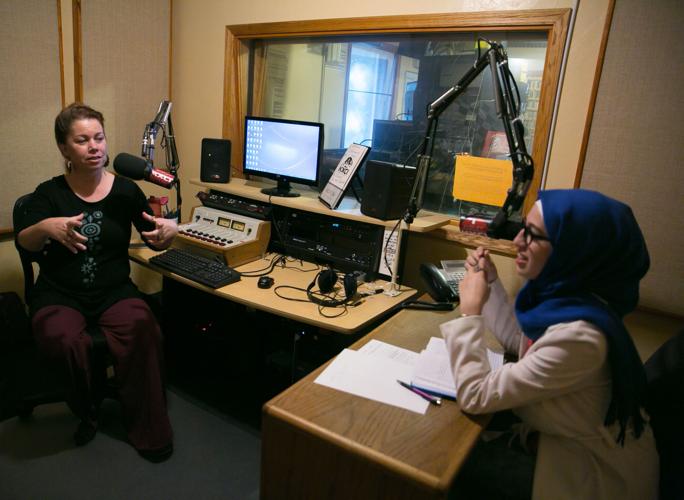When Houda, an 18-year-old Syrian refugee, and her family arrived in Tucson last July, they knew no one. They had been on a long, difficult journey after leaving their home in their beloved but devastated city of Aleppo three years earlier.
Her family had left in a hurry. They left in fear. The family ended up in Amman, Jordan, in limbo, praying, dreaming of immigrating to the United States. After a lengthy, numbing vetting process, Houda, her parents and younger sister were granted refugee status. But the family had to leave Houda’s older married sister and husband and their infant child behind in Jordan.
Houda and her family thought that their resettlement and acclimation might be slow and incognito. But within several months after arriving in Tucson, Houda, now 19 and a high school freshman, has become a voice for refugees like her and her family.
Last month, Houda’s voice went out on the airwaves through community radio station KXCI-FM, for which I am a volunteer. She is co-host of a program called “Mn Huna,” which is Arabic for “From Here.” The other co-host is Melanie, whom she met two weeks after arriving in Tucson at a reception for Syrian refugees organized by a newly formed group, Arizona Welcomes Refugees. The group holds monthly bonding reunions.
For the program, Melanie, 46, a native of Washington, D.C., and Houda use their first names only. They chat. They laugh. Houda, who spoke no English when she arrived in Tucson, sounds relatively comfortable and is improving. On the program’s KXCI website, a transcript in English and Arabic is available, making it accessible to a wider audience.
“My first story for you will be about my mother,” Houda says in the first podcast, which aired on Jan. 22. Melanie and Houda have produced three programs that can be found at www.kxci.org.
When Cathy Rivers, general manager at KXCI, became aware of the refugee gatherings, it made sense to her “to share their experience with our listeners, our community. So the idea of a mini-show and podcast was formed,” Rivers wrote me in an email.
In the midst of President Trump’s ban on refugees and immigrants from seven predominantly Muslim countries, including Syria, a program like this is critical. “It’s truly what we all need now,” Rivers wrote.
Recently I visited Houda at her family’s east-side apartment, along with Melanie. Houda’s father was at his restaurant job and Safa Najjar Merheb, a Lebanese-born translator, joined us. Houda’s mother served Syrian sweets and strong coffee. Syrians, Melanie told me, are famous for their hospitality. Houda’s sister Sara, who enjoys drawing, shared with me some words in Spanish that she has learned at her middle school.
The family first applied to live in France but was denied. They applied to the U.S. and were accepted, but they had no idea where they would be relocated. In Tucson, the summer heat, the desert and the buildings were a far cry from what they left.
Houda said Aleppo was known for its beauty, history and customs. People from different religions lived side-by-side peacefully, respectful of one another, she said.
“They lived together in harmony,” said Houda.
Then came the civil war between the regime of President Bashar al-Assad and his opponents, other religious and political factions, and eventually Russian intervention.
“Everything is upside down,” Houda said.
The family tried to make the best of it. They hoped that the civil strife would eventually end. War, however, intruded into their daily lives.
One day, Houda arrived at her school. A market that was next to the school was gone. A bomb had gone off earlier, dispersing everything and everyone in it. On the schoolyard, Houda and her schoolmates saw pieces of human bodies strewn around.
And after her father was arrested, detained for five days and tortured, the family realized they had to leave.
Houda and her family feel fortunate that they found refuge through new friendships in Tucson. But they fear for family members who remain in Syria and for Houda’s sister, husband and baby.
To write and to share stories about refugee families is Houda’s dream. She wants her adopted town to understand their experience and hopes and fears.
“Houda is doing an amazing job,” KXCI’s Rivers wrote. “I want to experience her learning, growth and adventures in our community just as our listeners do.”
I suspect we’ll hear more of Houda’s voice in the coming years.





